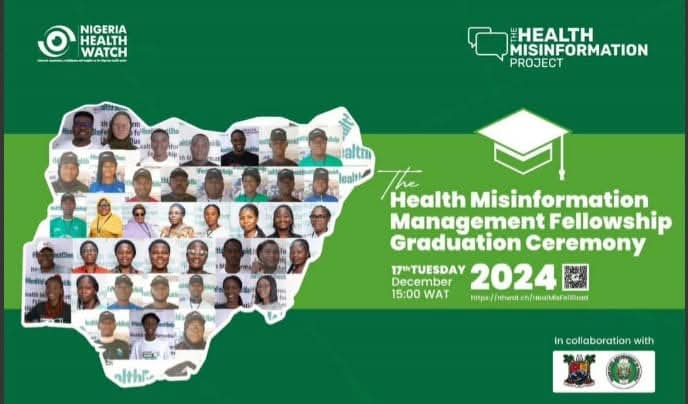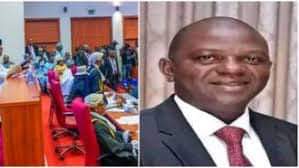Nigeria Health Watch empowers stakeholders & set to address risky health information disorders
In recent years, health misinformation has emerged as a significant challenge, undermining public health efforts, and putting lives at risk. False or misleading health information has led to misguided decisions, vaccine hesitancy, and a lack of trust in healthcare systems and providers.
Following the successful implementation of a fellowship programme to address health misinformation in 2023, Nigeria Health Watch, a leading health advocacy and communication organisation in Nigeria in collaboration with various stakeholders, has successfully implemented the second and third tracks of the Fellowship, targeting key stakeholders across multiple sectors including social media influencers, creatives and bloggers, nurses, midwives, traditional birth attendants, community pharmacists, chemist, traditional medicine providers and health educators with the tools to counter health misinformation, promote evidence-based health narratives, and foster public trust.
The Fellowship incorporated three interconnected tracks:
The Health Misinformation Management Fellowship – Focused on equipping influencers, bloggers, and creatives to produce accurate, compelling health content and combat false narratives online.
The Health Workers Misinformation Fellowship – Designed to enhance healthcare providers’ skills in identifying, addressing, and mitigating misinformation within their professional and community networks.
The Lagos State health educators Fellowship – A localised initiative targeting Health Promotion Officers (HPOs) in Lagos, emphasising community engagement and mobilization to combat misinformation at the grassroots.
Content Creation and Digital Engagement: Fellows from the Health Misinformation Management Fellowship produced over 168 pieces of health-focused content, garnering more than 56,000 views and nearly 63,000 interactions.
Community Outreach: Participants of the Health Workers Fellowship led grassroots educational campaigns, conducting advocacy visits to schools, communities, and healthcare facilities.
Lagos Community Impact: The Lagos Fellowship trained Health Promotion Officers from three health districts (Districts 1, 5, and 6) to engage their communities effectively, creating district-specific action plans and leveraging local expertise for sustainable outcomes.
Behavioral and Knowledge Shifts: Across the programs, there was a 31% increase in audience understanding of misinformation.
The fellowship leveraged a hybrid model, combining in-person sessions, virtual technical workshops, and weekly hands-on activities. Training methodologies were anchored on adult learning principles, ensuring practical, real-world application for participants.
In her opening remarks, Vivianne Ihekweazu, the Managing Director of Nigeria Health Watch, set the tone for the event by emphasising the collective responsibility to combat health misinformation and amplify credible information.
“This fellowship is not just a program; it is a movement. Over the past month, participants have engaged in intensive learning activities. From training sessions, media literacy workshops, and community sensitisation exercises, fellows have honed practical strategies to address health misinformation in real time.
Today, we celebrate the graduation ceremony of all three tracks. These fellows are now equipped to play a vital role in addressing health misinformation and fostering trust, both online and within their communities.
During the graduation ceremony, Stephanie Omoarebun, @Labcoatgirl, one of the social media influencer fellows, highlighted the critical role the fellowship has played in addressing health misinformation and empowering communities with accurate information.
“We are proud to have contributed to advancing accurate health information in our communities. This fellowship has equipped us with the tools, knowledge, and confidence to combat misinformation and ensure that people have access to credible health messages they can trust. It’s a responsibility we carry with pride and commitment,” she stated.
In her keynote address, Fatou Wurie emphasised the importance of building trust in an era dominated by misinformation, noting that trust remains the most powerful tool in changing behaviours and shaping public health outcomes.
“Trust, once it is built, is stronger than fear. When communities trust the information they receive, they are better equipped to make informed decisions about their health, and that is how we create lasting change. This fellowship has shown that fostering trust through credible messengers can turn the tide against misinformation,” she said.
The fellowship, designed to build the capacity of social media influencers, creatives, and bloggers, has enabled participants to amplify evidence-based health messages while addressing the challenges posed by health misinformation. Through this program, fellows engaged in creating impactful content, leveraging their platforms to improve public awareness and promote healthy behaviours across diverse communities.
The event’s highlight was the announcement of the Health Information Disorder Management Network, a collaborative initiative aimed at sustaining the efforts of the health misinformation management project by the Director of Programmes, Nigeria Health Watch, Dr Kemisola Agbaoye. The network will serve as a platform to collaborate, innovate, and amplify correct information, fostering ongoing partnerships, capacity building, and knowledge sharing among members. This initiative seeks to ensure a harmonised response to misinformation challenges and to promote accurate health communication at scale. See link to join the collaborative learning network here




